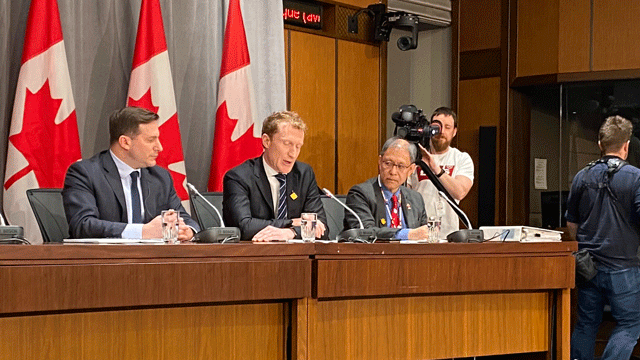
Indigenous Services Canada (ISC) Minister Marc Miller held a news conference on Good Friday on prevention, preparedness and its financial aid package that hopes to keep communities safe from COVID 19 and to help “plank the curve” now that the pandemic has hit nearly 20 First Nation and Inuit communities, infected 41 people and claimed one life.
“During this pandemic, my sole priority, one that is shared with the government of Canada, is the health and safety of Indigenous people,” said Miller.
“No one should take great comfort in the fact there have been few cases to date,” Miller said.
Miller referred to the $305 million for Indigenous communities and said each chief and council has received a letter from ISC and they will soon be getting that money.
“If it hasn’t hit their bank accounts, it will very shortly,” Miller promised.
He said once a positive case is identified in a community, leaders there should implement and follow their pandemic plan.
Next, that community can contact ISC for any support they need including personal protection equipment.
“The government of Canada will obviously supply, with an aspired 24 to 48 hour turnaround time, on the orders depending on volume,” Miller said
He stressed the importance of diligent contact tracking and test anyone the infected individual might have come in contact with.
Miller commended communities that have chosen to close their borders to outsiders but warned against a false sense of security.
He said erecting checkpoints are useful for tracking infections and raising public awareness, but they alone will not keep the virus out and communities still need to practice prevention measures like social distancing and hand washing.
“No one should take comfort in the fact that there are few cases (in Indigenous communities) to date,” Miller suggested.
The closing of borders will keep outsiders out with the exception of health care workers form the south.
Nurses and doctors travel to northern communities and can be seen as a risk because they normally work on a two week basis and travel from rural southern areas hard hit by the pandemic.
ISC said they have sanitary protocols in place to screen nurses and doctors before going into northern communities to ensure non-transmission within the health field.
“Nurses themselves and the doctors as well as medical officers that go in and out of communities are very, very aware of this protocol,” said Miller.
“They are at a heightened state of readiness to identify their own symptoms.”
Present at the conference along with Miller was Chief Medical Officer of Public Health Dr. Tom Wong.
Wong said another option is to have permanent health professionals living in communities.
“If you are a nurse or if you are graduating as a nurse, please, please consider working in the north because the north needs you,” Wong added ISC is aggressively recruiting nurses.
ISC said because of their remoteness, Indigenous communities have the opportunity to put in place measures ahead an outbreak to keep communities relatively safe and urged individuals to continue safe practices.
“You can actually go out for a bike ride or go fishing or go hunting. But its very important that you keep the physical distancing and avoid crowds.” Wong said.
First Nations communities in Manitoba and Ontario have requested assistance from the military to help with everything from controlling who enters a community to setting up field hospitals and helping in the event of the annual spring flood.
The 2nd Canadian Rangers have been activated in Nunavik where a sixth person tested positive for the novel coronavirus.
Six Nations of the Grand River has eight confirmed cases. One person has died from the virus.
“Let me be clear. This is just the beginning. We know more support will be needed. And we will be there to make sure no Indigenous community is left behind,” Miller said.










Before all this health concern with covid 19. Many First Nations,Metai and inuit communities had very less assistance from provincial and federal govt’s. from clean drinking water, health care,help for elders,destruction of mother earth. For the amount of resources our land has is a small amount of money received. The govt’s spend money to other countries and our very own have no medical clinic and how many DR,LPN’S that have to go outside of Canada to continue their profession. How come the govt’s can’t have a hospital, clinic or use many community centres for the DR’S,LPN’s to help our people. This has been going on far to long. Where even our elders are needing medical help and don’t get any help.To me i have seen it for a long time ,how others outside our people get more help and leaving us to to care for each other.We have seen what the govt’s are all about when we try to protect our lands and waters. This PM and many more have other intendsons’s to listen to oil and gas, mining and other countries . It is sad to see smaller communities within the oil and gas have to drink dirty water because of companies. Now our communities need the govt’s more what do they do nothing. AS i can see they take care of their own and steal our lands and no clinics hospitals for our people. Many more will die if we don’t protect each other and it is sad to see. Our Chiefs and elders need to voice their concern, but remember we should all stand up for our elders as they stood for us.